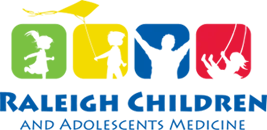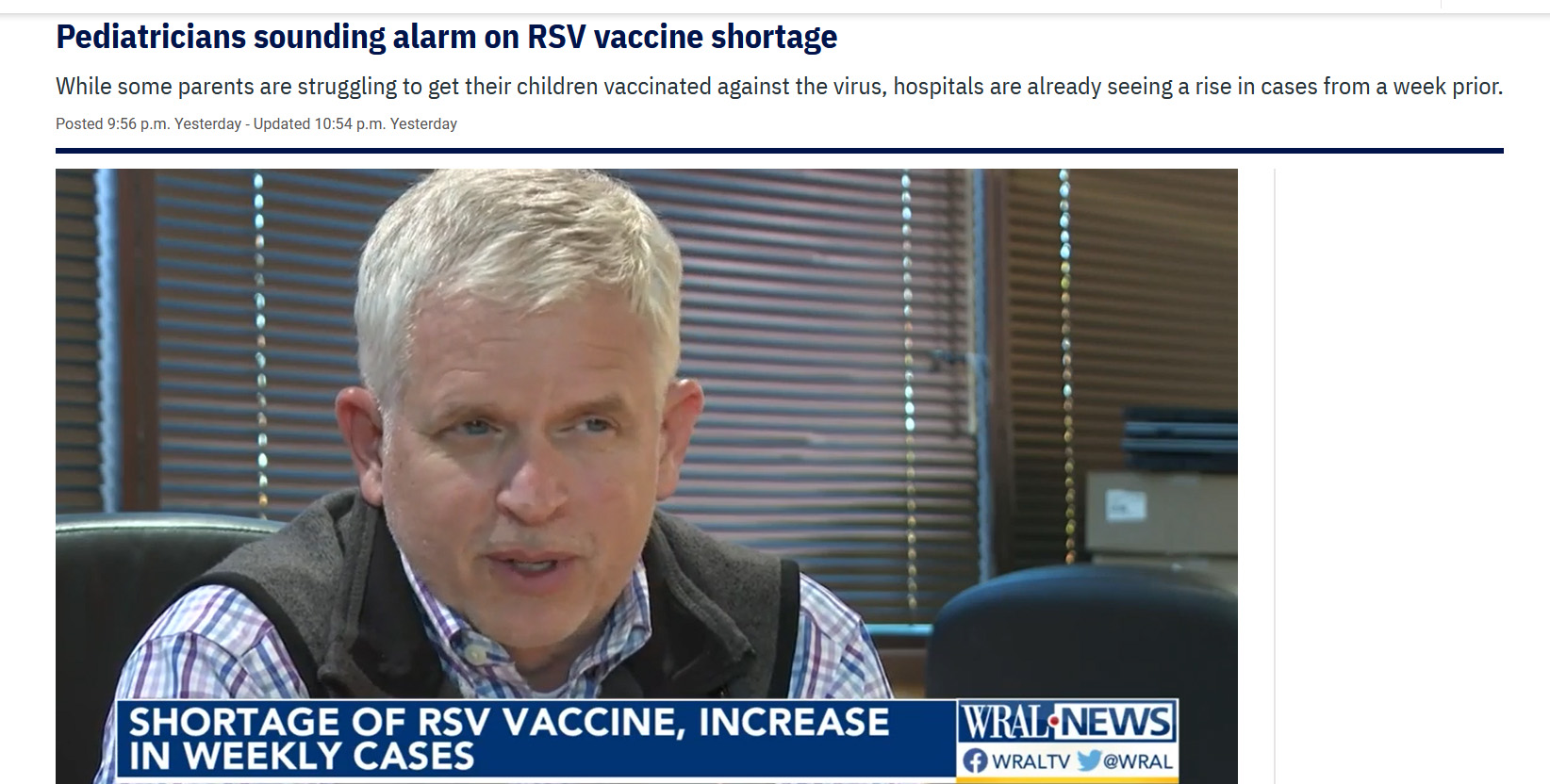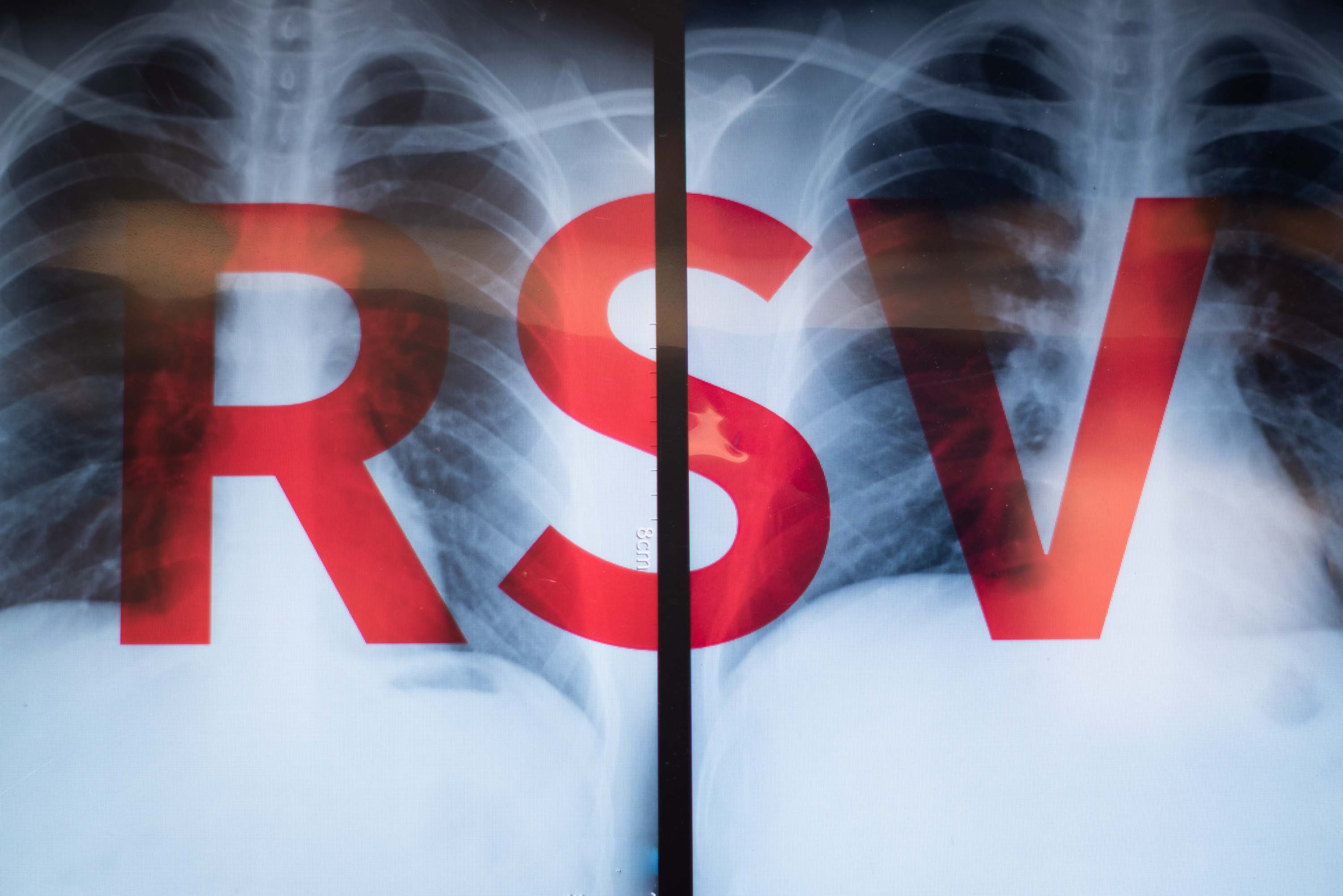Update 11/3/2023
RSV Antibody Vaccine Shortage - Appointment Scheduling Halted - Dr. Meares spoke to WRAL News about the Shortage of RSV Vaccine (video link here)
To update - yesterday (11/2/2023) afternoon, we learned that we will not be able to order any more RSV antibody vaccine. This was news - not just for RCAM - it is the case with everyone who was planning to offer this much-anticipated RSV prevention.
We will be able to give vaccine to those who are already scheduled.
Palivizumab (Synagis) will still be an option for the most high-risk infants.
We are still hopeful for next year. We have no inside information, but one would think that another year would make a big difference for what sounds like production volume issues.
ONE OTHER OPTION TO KEEP IN MIND: there is a second RSV vaccine for adults that - if given between 32 and 36 weeks gestation of a pregnancy - can protect that child beginning within minutes of birth from antibodies passed from the mother.
Update 10/21/2023
Can I get my child their RSV antibody vaccine (nirsevimab) at RCAM?
Yes - but there are some important updates about limited availability:
- RCAM continues to schedule RSV Antibody Vaccine Clinics for infants for whom vaccine is available.
- STATE vaccine (vaccine for Medicaid and Uninsured) is NOT YET AVAILABLE. We do not know when the state will allow us to begin to order RSV antibody vaccine.
- PRIVATE vaccine (vaccine for Private Health Insurance) is currently ONLY AVAILABLE IN THE SMALLER DOSE (the dose for infants under 11 pounds). Therefore, RSV antibody vaccine is not yet available for infants 11 pounds and up (and under under 8 months old).
- We are not aware of anywhere else to find the RSV antibody vaccine. If anyone were to get it first, it would likely be the Health Department.
- We will update as this disappointing situation changes (we hope soon).
Update 10/12/2023
RSV (Respiratory Syncytial Virus) Illness
- Almost all children will catch RSV before they turn 2 years old.
- For most healthy children, RSV is like a cold. However, some infants get very sick.
- Those at highest risk to get very sick from RSV are young infants and young children with underlying medical conditions.
- RSV is the most common cause of hospitalization of children under 1 year old.
- 2 to 3 out of every 100 infants with RSV require hospitalization.
- RSV is most typically most active from October to the end of March.
RSV Prevention
- For good reason, researchers have worked for decades to find ways to limit the impact of RSV.
- This year, there are two new vaccines available to combat RSV:
- One of the new RSV vaccines targets older adults (60 years and up). It can also be used to protect infants when given to a pregnant mother who is between 32 and 36 weeks gestation. Within a few weeks, the antibodies that the mother produces will be passed to her newborn infant and provide that infant with protection from RSV. If you are pregnant, you should discuss this vaccine with your obstetrician.
- A second new RSV antibody vaccine can by given directly to young children, and it is called nirsevimab.
Nirsevimab
- This vaccine is given as an injection and may be included with or between your baby's routine immunizations.
- Nirsevimab has been shown to reduce the risk of both RSV-related hospitalizations and health care visits in infants by about 80%.
- This shot works a little differently than other vaccines. It provides antibodies that start working to protect babies right away.
- The protection from nirsevimab lasts for the duration of a typical RSV season (around 5-6 months).
- FYI: Synagis is another RSV antibody vaccine that works just like nirsevimab that has been in use for about 20 years. Availability was very limited due to its great expense and the need for monthly injections. While nirsevimab works differently than a lot of vaccines, it is definitely not a new way to provide immunity.
Who should get Nirsevimab?
- All infants younger than 8 months old: one dose of nirsevimab is recommended to be given during or right before the RSV season
- Some infants aged 8 to 19 months old: one dose entering their second RSV season for older infants who are at higher risk for severe illness (see below)
What 8 to 19 months old children are at Higher Risk for Severe Illness due to RSV?
- Children with chronic lung disease
- Children born prematurely who required medical support (chronic corticosteroid therapy, diuretic therapy, or supplemental oxygen) any time during the 6-month period before the start of the second RSV season
- Children who are severely immunocompromised. Children with cystic fibrosis who have manifestations of severe lung disease (previous hospitalization for pulmonary exacerbation in the first year of life or abnormalities on chest imaging that persist when stable) or have weight-for-length that is <10th percentile
- American Indian and Alaska Native children.
In the case of mothers who had the RSV vaccine during pregnancy (see above), do their infants need the RSV antibody immunization?
- In most situations, the answer is, "No." Their infants should already be protected.
Want more info?
- The Centers for Disease Control and Prevention offers a good summary: Preventing RSV
- The American Academy of Pediatricians' HealthyChildren.org website; RSV: When It's More Than Just a Cold



